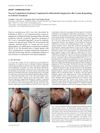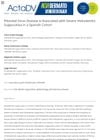 17 citations,
August 2010 in “Journal of the American Academy of Dermatology”
17 citations,
August 2010 in “Journal of the American Academy of Dermatology” Unroofing is an effective, less invasive, and cost-effective surgery for hidradenitis suppurativa with low recurrence and improved patient quality of life.
 14 citations,
January 2015 in “Acta dermato-venereologica”
14 citations,
January 2015 in “Acta dermato-venereologica” Acitretin significantly reduced inflammatory attacks in a woman with Naevus Comedonicus Syndrome but caused side effects.
 11 citations,
September 2000 in “JEADV. Journal of the European Academy of Dermatology and Venereology/Journal of the European Academy of Dermatology and Venereology”
11 citations,
September 2000 in “JEADV. Journal of the European Academy of Dermatology and Venereology/Journal of the European Academy of Dermatology and Venereology” The document concludes that awareness and understanding of hidradenitis suppurativa are increasing, but effective treatments are still needed.
11 citations,
September 1996 in “Journal of applied polymer science” Potassium cyanide treatment changes hair's disulfide bonds, making it more elastic.
9 citations,
August 2021 in “Experimental dermatology” Hidradenitis suppurativa is a skin disease caused by the breakdown of the skin's natural immune barriers, especially around hair follicles.
 7 citations,
October 2020 in “Journal of The American Academy of Dermatology”
7 citations,
October 2020 in “Journal of The American Academy of Dermatology” People with hidradenitis suppurativa have a higher risk of heart attacks and strokes.
 4 citations,
January 2021 in “Archives of dermatological research”
4 citations,
January 2021 in “Archives of dermatological research” The study created a new model to better understand human hair growth and health.
 4 citations,
June 2019 in “International Journal of Dermatology and Venereology”
4 citations,
June 2019 in “International Journal of Dermatology and Venereology” Some skin diseases may indicate a higher risk of metabolic syndrome and related health issues.
 4 citations,
June 2002 in “Clinical and experimental dermatology”
4 citations,
June 2002 in “Clinical and experimental dermatology” Effective treatment for hidradenitis suppurativa varies, with antibiotics commonly used and surgery as an option, but no single method is universally successful.
 3 citations,
December 2000 in “Journal of the Royal Society of Medicine”
3 citations,
December 2000 in “Journal of the Royal Society of Medicine” Antiandrogen therapy may be beneficial for women with hidradenitis suppurativa.
 2 citations,
September 2023 in “Health science reports”
2 citations,
September 2023 in “Health science reports” People with certain skin conditions, especially androgenic alopecia, are more likely to have metabolic syndrome.
2 citations,
January 2021 in “PubMed” Botulinum toxin type A may help treat hidradenitis suppurativa.
 2 citations,
May 2019 in “Journal of the American Academy of Dermatology”
2 citations,
May 2019 in “Journal of the American Academy of Dermatology” Facial hidradenitis suppurativa can be mistaken for acne but requires different treatment.
 1 citations,
October 2023 in “JEADV. Journal of the European Academy of Dermatology and Venereology/Journal of the European Academy of Dermatology and Venereology”
1 citations,
October 2023 in “JEADV. Journal of the European Academy of Dermatology and Venereology/Journal of the European Academy of Dermatology and Venereology” A man developed skin lesions as a side effect of a gamma secretase inhibitor used for treating a tumor.
 1 citations,
January 2021 in “Journal of the Dermatology Nurses’ Association”
1 citations,
January 2021 in “Journal of the Dermatology Nurses’ Association” The convention discussed various skin conditions and treatments, and highlighted the importance of vaccinations for patients on immune-altering medications.
1 citations,
April 2019 in “The journal of investigative dermatology/Journal of investigative dermatology” People with Hidradenitis Suppurativa have less diverse skin bacteria and different bacterial metabolism than healthy individuals.
 1 citations,
April 2018 in “Revista da Sociedade Portuguesa de Dermatologia e Venereologia”
1 citations,
April 2018 in “Revista da Sociedade Portuguesa de Dermatologia e Venereologia” Hidradenitis suppurativa is a chronic skin condition more common in women, linked to genetics and lifestyle factors, and associated with various other health issues.
 1 citations,
January 2018 in “Pediatric Dermatology”
1 citations,
January 2018 in “Pediatric Dermatology” Finasteride may help treat hidradenitis suppurativa in children, but concerns exist about ethics, safety, and proper use.
1 citations,
June 2006 in “Experimental dermatology” The conclusion suggests that early signs of hidradenitis suppurativa may start in the hair follicle, with genetic and immune factors playing a role, highlighting the need for more research on the hair follicle's immune system.
 November 2024 in “Journal of the European Academy of Dermatology and Venereology”
November 2024 in “Journal of the European Academy of Dermatology and Venereology” More effective treatments are needed for alopecia areata, hidradenitis suppurativa, and vitiligo.
 July 2024 in “Research Square (Research Square)”
July 2024 in “Research Square (Research Square)” Certain proteins can either protect against or increase the risk of hypertrophic scars.
 June 2024 in “British Journal of Dermatology”
June 2024 in “British Journal of Dermatology” Hidradenitis suppurativa has had many names, but its naming is still not agreed upon.
 April 2024 in “Journal of applied cosmetology”
April 2024 in “Journal of applied cosmetology” Botulinum toxin shows promise for treating skin conditions but needs more research for safety and effectiveness.
 January 2024 in “JEADV Clinical Practice”
January 2024 in “JEADV Clinical Practice” Patients with certain skin diseases are willing to spend significant time on treatment, indicating a high impact on their lives and a need for better treatments.
 November 2023 in “JAAD case reports”
November 2023 in “JAAD case reports” Exogenous testosterone use may be linked to developing hidradenitis suppurativa.
 September 2023 in “Acta dermato-venereologica”
September 2023 in “Acta dermato-venereologica” Pilonidal sinus disease is linked to more severe hidradenitis suppurativa.
 September 2023 in “Journal of the American Academy of Dermatology”
September 2023 in “Journal of the American Academy of Dermatology” Having PCOS does not make hidradenitis suppurativa worse.
 August 2023 in “The journal of investigative dermatology/Journal of investigative dermatology”
August 2023 in “The journal of investigative dermatology/Journal of investigative dermatology” People with certain skin disorders are more likely to have alcohol problems, especially if they also have mental health issues like depression and anxiety.
 November 2022 in “The journal of investigative dermatology/Journal of investigative dermatology”
November 2022 in “The journal of investigative dermatology/Journal of investigative dermatology” Skin organoids with NCSTN mutation show changes in hair follicle development and higher inflammation, key features of Hidradenitis Suppurativa.
September 2022 in “International journal of green and herbal chemistry” The shampoo made with fermented wheat gluten and herbs was good for cleaning, conditioning, and promoting hair growth.
























